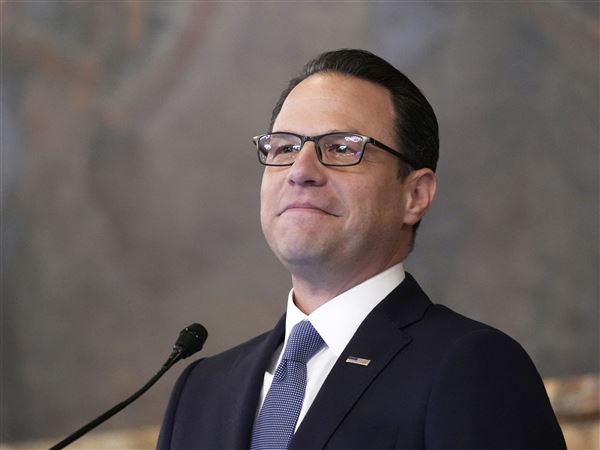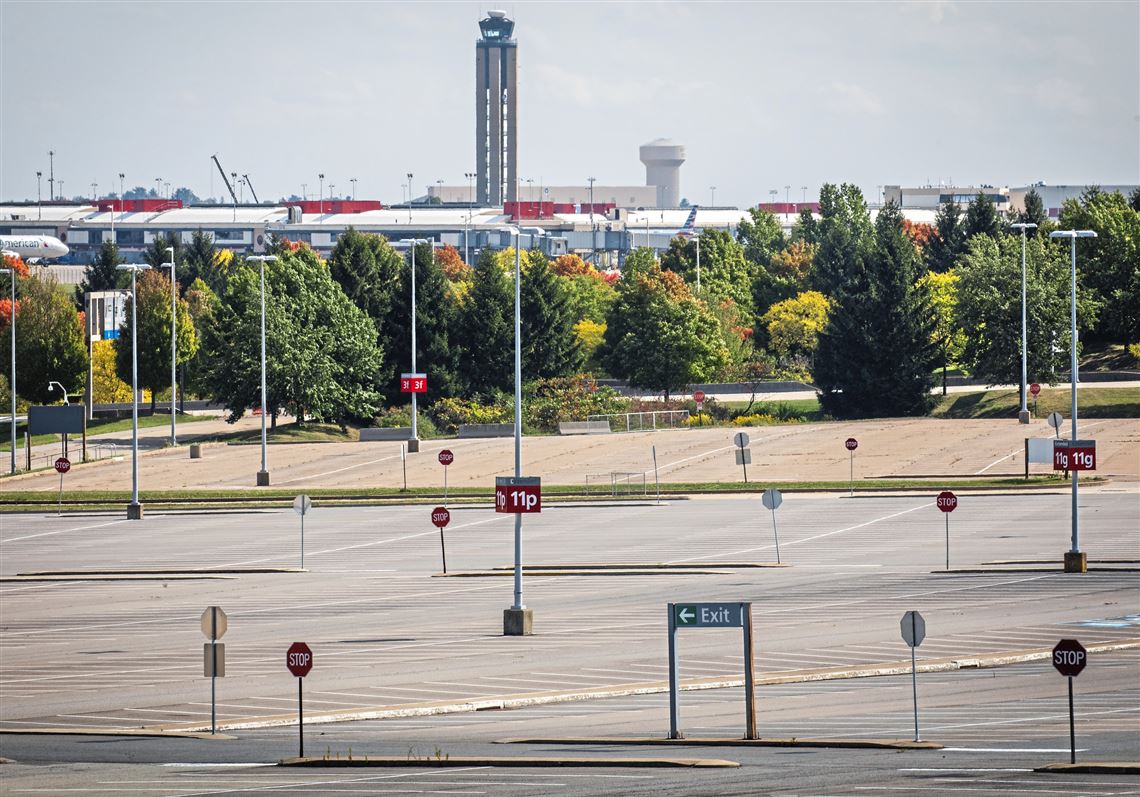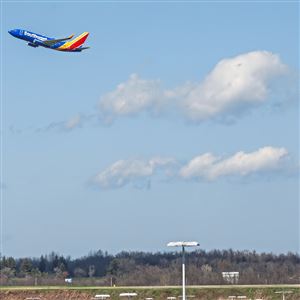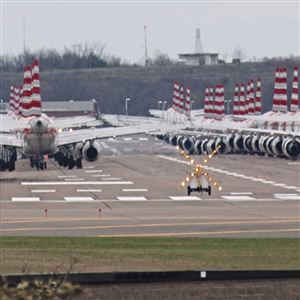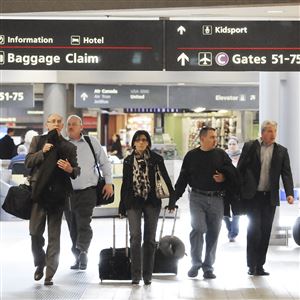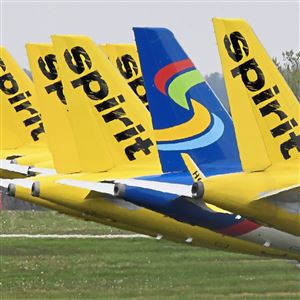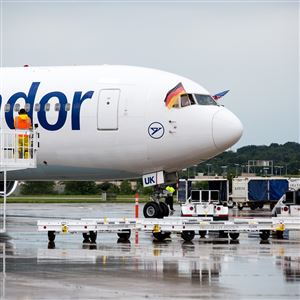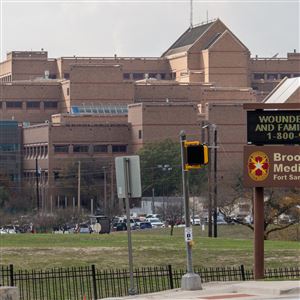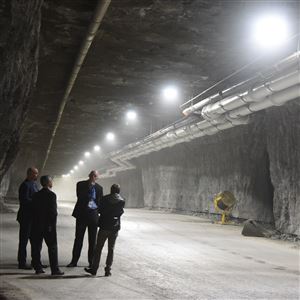Pittsburgh International Airport could be bracing for possible flight reductions and furloughs involving some of its carriers should Congress fail to act before Thursday to provide more COVID-19 related relief to the suffering industry.
The dozens of potential layoffs locally are but a small fraction of the more than 35,000 flight attendants, pilots and other airline workers who could lose their jobs when prohibitions barring airlines from furloughing workers end Oct. 1.
Although there appears to be support in Congress for giving more aid to the airlines beyond the $25 billion approved in March, that could get derailed by the stalled talks over a broader coronavirus relief package.
Without a deal, airports such as Pittsburgh could face reductions in flights, while small airports could lose service altogether, according to industry experts.
“No one is immune to this virus. No one is immune from being disenfranchised today,” said William Swelbar, a Massachusetts Institute of Technology researcher.
In a Worker Adjustment and Retraining Notification Act notice filed with the state, United Airlines already has signaled that it could lay off up to 66 of about 115 employees at Pittsburgh International on Oct. 1.
David Gonzalez, a United spokesman, said this week he did not have “information to share at this time on how many will be affected by potential furloughs” without additional aid from the federal government.
Although Indianapolis-based Republic Airways had filed a WARN notice in the summer stating it could be laying off up to 183 employees in Pittsburgh, that has been avoided, the carrier reported Tuesday.
“Fortunately, we were able to find solutions to mitigate and rescind all of our furloughs for PIT,” spokeswoman Lauren Gaudion said.
The airline has about 550 workers in Pittsburgh, where it operates a maintenance base and provides flights on smaller jets for United, American and Delta airlines.
Republic currently handles about 15 departures a day at the airport, about half of the normal rate thanks to the pandemic, which has sent the industry as a whole into a tailspin.
American Airlines, Pittsburgh’s second-largest carrier in terms of passengers, has stated that it could lay off as many as 19,000 employees across its system without additional aid.
Spokesman Matt Miller said he could not provide a breakdown by location, but stressed that the impact in Pittsburgh, where it has about 900 workers, “would be relatively small relative to other hub markets like Philadelphia.”
Southwest Airlines, the airport’s largest airline, has said it is not anticipating any furloughs come Thursday. It has 138 employees here, with 36 daily departures to 14 cities.
Delta Air Lines, likewise, has indicated it has no plans to furlough any ground employees or flight attendants and that there would be no pilot layoffs at least until Nov 1.
Nonetheless, that doesn’t mean Pittsburgh won’t be affected if Congress and President Donald Trump fail to deliver an aid package.
Mr. Swelbar and Robert Mann, president of R.W. Mann & Co., an airline industry consultant, said the airport could face flight reductions as carriers juggle a depleted workforce and redirect aircraft.
“Unfortunately, it’s a down-the-line impact. It affects everyone,” Mr. Swelbar said.
Local passengers could see cuts in service to airline hubs, Mr. Mann said, although he added that Pittsburgh still has a sufficient regional economy to “justify quite a bit of service.”
Michael Boyd, a Colorado-based aviation consultant, said the biggest impact in Pittsburgh may not be in what it loses but in what it doesn’t gain. There may be no growth in service for the next two years or more, he maintained.
“Its growth projections are going to be cut significantly.” he said. “Airlines aren’t going to be able to add service.”
That could be more bad news for Pittsburgh International. It has seen traffic plummet and the number of daily flights plunge by half, from about 180 to 90-100, since the pandemic hit in March.
But the ones that could be hit the hardest are small airports, experts said.
American already has announced that it will end service to 15 small markets, including Williamsport, Pa., on Oct. 7 as a result of low demand and the expiration of requirements attached to the March bailout.
Delta already has suspended service to 11 U.S. cities, including Erie and Wilkes-Barre/Scranton because of the pandemic.
“The smallest communities are going to get hurt first,” Mr. Swelbar said.
So far, Arnold Palmer Regional Airport in Latrobe has been spared deep cuts.
Gabe Monzo, executive director of the Westmoreland County Airport Authority, said Spirit Airlines is scheduled to resume nonstop flights to Myrtle Beach, S.C., and Orlando, Fla., on Oct. 8.
Flights had been suspended since Sept. 8 because of a runway improvement project.
However, the airline has dropped a nonstop flight to Fort Lauderdale, Fla., that was in place before the runway work. Getting to that city now will involve a connecting flight. Mr. Monzo said Spirit ended the nonstop because of a lack of demand caused by the virus.
He added that the airport hasn’t heard anything from Spirit about any additional cuts. It typically ends the Myrtle Beach flight in November and adds Tampa and Fort Myers, Fla., for the winter. Mr. Monzo is hopeful that again will be the case.
Initial bookings for the Orlando and Myrtle Beach flights set to resume next week have been fairly strong.
“Things are starting to pick up and we’re hoping to continue that way,” Mr. Monzo said.
While many small airports could be facing severe cuts if airlines don’t get more federal aid, Mr. Mann doesn’t believe Arnold Palmer will be one of them given Spirit’s emphasis on low fares and leisure travel.
“I would say Latrobe is probably OK, not on size but because of the orientation of the carrier that serves it,” he said.
Mark Belko: mbelko@post-gazette.com or 412-263-1262.
First Published: September 30, 2020, 10:09 a.m.

